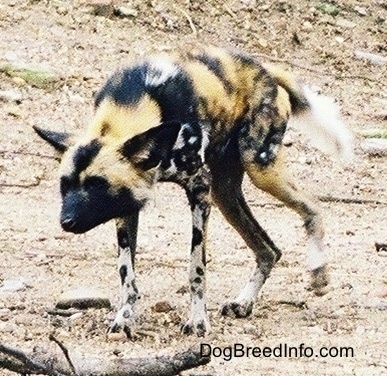
African Wild Dog
AF-ri-kuhn wahyld dawg
The African Wild Dog has spotted coloration on its coat. It is sufficiently unique that no two animals have the same pattern. It has very good eye sight and, unlike other canids, it hunts only by sight and not by scent. Its body is thin and strongly muscled with long, thin legs. Its ears are large and pointed upright.
African Wild Dogs are not domesticated dogs. They live in the wild and in zoos. Inside their dog packs they have strong family bonds headed by an alpha male and alpha female. They live in stable groups of related males with related females leaving to join a different pack at 14 to 30 months old. Pups are given priority at feeding; adults wait until youngsters have finished. They all cooperate with each other when hunting, following the direction signals of the alpha male. Hunting occurs around dawn and dusk. Gestation is approximately 71 days with a litter of 6 to 10 puppies. Pups can begin eating regurgitated solid food at about 3 weeks. During the first 2 months the pups are protected by 1 to 2 adults when the pack is hunting. Pups are weaned in 10 to 12 weeks and reach sexual maturity between 12 to 18 months. In the wild, the African Wild Dog eats gazelle, antelope, zebra, warthog and drink little water because they receive adequate amounts from blood of prey. In captivity, such as a zoo, they eat dried dog food and bones.
Length of body is 30 - 40 inches (71 - 85 cm)
The tail is 12-16 inches (31-41cm) long.
Weight: 44 to 60 pounds (20.5 - 27 kg)
-
The African Wild Dog lives outdoors. It is an undomesticated breed living in Africa and in zoos.
This wild dog has great endurance; on the final part of the hunt it can reach speeds of up to 37 mph.
About 10 years.
2 to 21 pups with the average of about 6 to 9 pups
-
The African Wild Dog is considered an endangered species. It can be found in Africa south of the Sahara Desert in areas of semi-desert to mountains and in zoos.
-
-